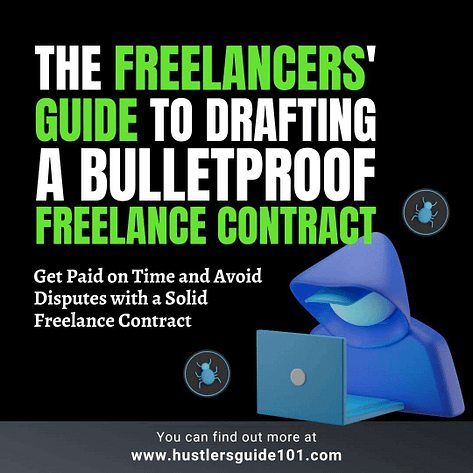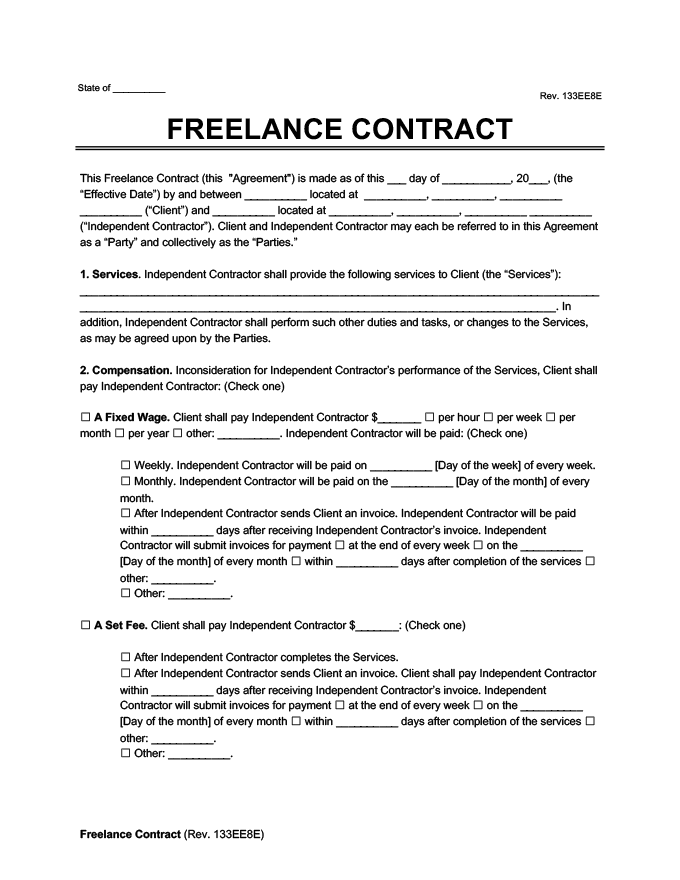
If you’re a freelancer, you know the importance of having a clear and thorough contract in place before beginning any work. A contract not only protects both the client and the freelancer. But it also helps to ensure that everyone is on the same page. Avoids misunderstandings or disputes down the line. But you must be wondering. How to write a freelance contract?
In this blog post, I included the steps you need to take to write a strong and effective freelance contract. Whether you’re a seasoned freelancer or just starting out, it’s important to have a solid understanding of a contract. How to write a freelance contract and what to include. By following these steps, you can protect yourself and your client and set the stage for a successful collaboration.
Before we move to the steps, I want to share a story. So you can understand the importance of signing a freelance contract.
My experience with freelance contract

As a freelance writer, I’ve had my fair share of experiences with contracts. One situation that stands out in my mind is when I was hired to write a series of blog posts for a new client. We had a verbal agreement. About the scope of work and the payment terms. But I didn’t think it was necessary to have a written contract in place.
Unfortunately, things were not as smooth as I had hoped. The client was difficult to work with. He kept changing his mind about the content and direction of the blog posts. I ended up having to rewrite several of the posts. That added a lot of extra time and effort to the project.
When it came time to request payment, the client refused to pay the full amount that we had agreed upon. They claimed that I hadn’t delivered the work that they had asked for. Even though I had followed their instructions to the best of my ability.
I was left feeling frustrated and helpless. Then, I realized that having a written contract in place would have helped to prevent this situation. A contract would have clearly outlined the scope of work, payment terms, and any other expectations, which could have helped to avoid misunderstandings and disputes.
Since that experience, I’ve learned the importance of always having a written contract in place. It’s better to be safe than sorry. Having a contract in place can help to protect both parties and ensure a smooth and successful project.
Why do I need a freelance contract signed?

There are several reasons why you need a freelance contract signed:
- Protection: A freelance contract helps to protect both the freelancer and the client by clearly outlining the terms and conditions of the work. It specifies the scope of work, payment terms, ownership and usage rights, confidentiality provisions, and a termination clause, which can help to prevent misunderstandings or disputes.
- Legal recourse: If a dispute arises, a signed contract provides legal recourse for both parties. It establishes a written record of the terms and conditions of the work, which can be used as evidence in the event of a dispute.
- Professionalism: Having a signed contract in place shows that you are professional and take your work seriously. It sets expectations and helps to build trust between the freelancer and the client.
- Clarity: A signed contract helps to ensure that both parties are on the same page and understand their respective roles and responsibilities. This can help to avoid confusion or misunderstandings during the course of the work.
In short, a signed freelance contract is essential for protecting both parties, establishing legal recourse, demonstrating professionalism, and ensuring clarity. It’s always a good idea to have a contract in place before beginning any work as a freelancer.
How to write a freelance contract?
Here are some steps that I follow when writing a freelance contract:
Identify the parties involved:
The contract should clearly state the names and contact information of the client and the freelancer. This may seem obvious, but it’s important to make sure that both parties are properly identified in the contract.
Define the scope of work:
The contract should outline the specific tasks that the freelancer will be responsible for completing. This could include the type of work (e.g. blog post, white paper, etc.), the length of the piece, the due date, and any other relevant details.
Discuss payment terms:
The contract should specify how much the client will pay the freelancer. Additionally, when the client will make the payment (e.g. upon completion of the work or in installments), and what form the payment will take (e.g. check, Payoneer, etc.)? It’s also a good idea to include language about what happens if the client doesn’t pay on time or if the freelancer has to terminate the contract early.
Outline the ownership and usage rights:
The contract should specify who owns the rights to the work once it is completed. For example, will the freelancer retain the rights or will the client have exclusive ownership? It’s also important to discuss how the clients or freelancers can use work. For example, can the client republish the work on other platforms or use it for marketing or portfolio purposes?
Address confidentiality:
If the work involves sensitive or confidential information, the contract should include language about how the freelancer will handle this information. This could include a non-disclosure agreement (NDA) or other confidentiality provisions.
Include a termination clause:
It’s important to have a plan in place in case either party needs to terminate the contract early. This could be due to non-payment, breach of contract, or any other reason. The termination clause should outline the steps that will be taken in this situation. Such as any payment that may be owed and any obligations that the freelancer must fulfill before the contract ends.
Have the contract reviewed by a lawyer:
It’s always a good idea to have a lawyer review your contract, especially if you’re dealing with complex issues or have a lot at stake. A lawyer can help you to identify any potential legal issues and make sure that the contract is fair and protects your interests.

FAQs
Do I really need a freelance contract?
Yes, it’s always a good idea to have a written contract in place before beginning any work as a freelancer. A contract helps to protect both the freelancer and the client by clearly outlining the terms and conditions of the work. The contract helps you establish a written record of the terms and conditions of the work to use as evidence in the event of a dispute.
What should I include in a freelance contract?
A freelance contract should include the names and contact information of the client and the freelancer, the scope of work, payment terms, ownership and usage rights, confidentiality provisions (if necessary), and a termination clause. It’s also a good idea to include any other details or expectations relevant to the project.
Can I use a template for my contract?
It is fine to use a template as a starting point for your contract, but it’s important to customize the template to fit your project’s specific needs and circumstances. A template may not cover all of the details that are relevant to your project, so it’s important to review and revise the template to make sure that it covers all of the necessary topics.
Should I have a lawyer review my freelance contract?
It’s always a good idea to have a lawyer review your contract, especially if you’re dealing with complex issues or have a lot at stake. A lawyer can help you to identify any potential legal issues and make sure that the contract is fair and protects your interests.
Wrapping up ‘How to write a freelance contract?’
It’s a wrap for the guide ‘how to write a freelance contract.’ A freelance contract is an essential tool for any freelancer. By outlining the scope of work, payment terms, ownership and usage rights, confidentiality provisions, and a termination clause, you can protect yourself and your client and ensure that both parties are on the same page.
Don’t be afraid to have a lawyer review the contract to make sure that it is legally sound and protects your interests.
Are you wondering what other guides might help you in your freelance business? I got you covered from all sides with these guides:
HOW TO CREATE A FREELANCE AGENCY? [5-STEP RELIABLE GUIDE]
15 TIPS YOU NEED TO CONSIDER WHILE HIRING A FREELANCER
HOW TO HIRE A FREELANCER ON FIVERR? [ULTIMATE 7-STEP GUIDE]
HOW TO HIRE A FREELANCER ON UPWORK? [ULTIMATE GUIDE 2023]
FREELANCE DGITAGS.IO REVIEW: WORKFLOW, FEATURES, PROS, CONS
Still have some queries? Shoot them in the comments and I will be as fast as Flash.







